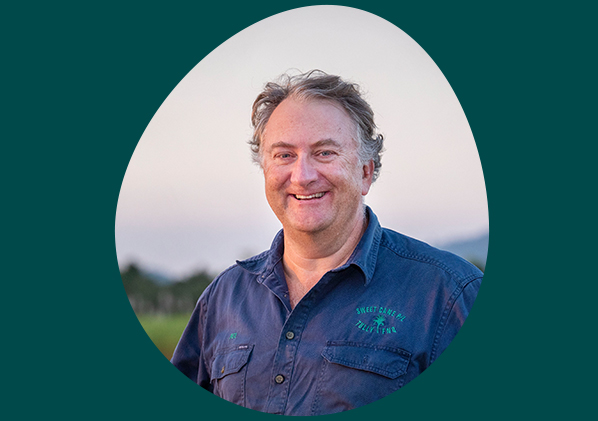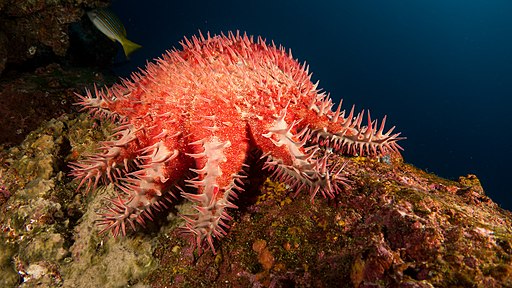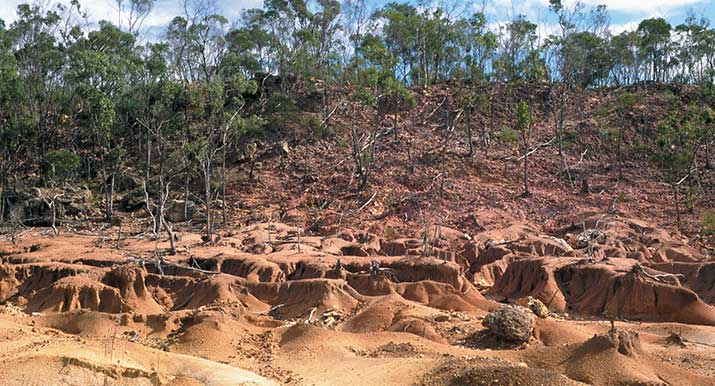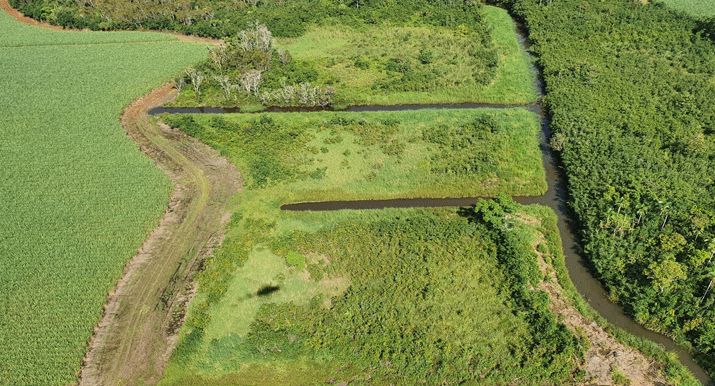Valuing and rewarding good land stewardship
How it works
GreenCollar works in partnership with farmers, graziers and other land managers to create projects that improve land management practices and the quality of water flowing to the Great Barrier Reef. Reef Credits are generated based on verified water quality improvements and income derived from the sale of these credits through a voluntary market. Land managers receive proceeds from the sale of credits, creating a new and diversified income stream – all without compromising the productivity of the land.
Anyone who is a landholder or land manager within the Great Barrier Reef catchments can undertake a Reef Credit project. To find if your project or your property is eligible please contact us.
Project development process
Start – Project Scoping
Our expert team works with you to identify project options that are suitable for your property. A project questionnaire is completed which clarifies the historical and potential future management of your land. If a wetland or gully project is possible, a site visit is important to complete high level scoping of a possible project.
Step 1 – Heads of Agreement
Scoping out a Reef Credit project for your property is the beginning of a partnership between you and GreenCollar. At this stage, we ask you to sign a Heads of Agreement. This is an document that outlines our partnership, how we will work together and clarifies project roles and responsibilities.
Step 2 – Record Collection and Feasibility Assessment
For farm practice projects, GreenCollar will collect farm records that help establish a seven-year historical baseline, using fertiliser applications, soil tests, yield and land management information. For gully or wetland projects, this step may also include land surveys, water flow modelling and aerial imagery analysis. This work allows GreenCollar to accurately calculate the amount of Reef Credits that will could be generated by your project.

Step 3- Reef Credit Assessment and Project Plan
GreenCollar will provide you with a Reef Credit Assessment that outlines the number of Reef Credits that could be generated from your Project. The assessment takes into account the historical baseline and proposed changes to your farming practices outlined in your personalised Project Plan. For gully and wetland projects this may include conceptual designs and scope of works.

Step 4 – Project Delivery Agreement
When you and GreenCollar agree to proceed with a Reef Credit Project, GreenCollar will prepare a Project Delivery Agreement. This is a legal document which outlines the partnership, financial arrangements, the agreed project plan and all aspects of project roles and responsibilities.

Step 5 – Project Implementation and Monitoring (Gully and Wetland)
Farm practice projects, move straight to validation and audit (step 6). For gully and wetland projects, GreenCollar will work with Greening Australia and agreed contractors to undertake gully remediation and/or wetland construction works in accordance with the agreed project site design. Monitoring systems may be installed to measure water quality results, which are used to calculate the Reef Credits generated by the project.
Step 6 – Project Registration and Reef Credit Issuance
GreenCollar will work closely with you to submit a Project Application to the Reef Credit Secretariat – Eco-Markets Australia. One site works or your first project year is completed, GreenCollar will organise and pay for an independent audit of the project and lodge all necessary documents to ensure Reef Credits are issued.
Ongoing – Annual Reporting and Payments
GreenCollar will sell Reef Credits on your behalf on the voluntary market, with proceeds shared according to the PDA. We will then maintain regular support and contact throughout the next 10 – 25 year to ensure projects reach their full commercial and environmental potential while managing and mitigating risk.

Management Methods
This method earns Reef Credits through quantified reductions in the amount of Dissolved Inorganic Nitrogen (DIN) flowing to waterways and the Reef through improved nutrient management practices.
Reducing DIN helps prevent algal bloom, which in turn prevents outbreaks of Crown of Thorn Starfish, a breed of invasive Starfish that eats new coral faster than it can grow.

This method earns Reef Credits based on quantified reductions in the amount of fine sediment flowing to the Great Barrier Reef from gully erosion. Remediation of gullies can include reshaping, revegetating, engineering control structures, and managing grazing.
Fine sediment flowing to the reef from the land has an impact on the health of the reef as it interferes with filter feeding organisms, reduces coral recruitment, alters the quantity and quality of light available, and smothers corals. It can also affect reproductive cycles and early development of coral and some species of fish.

Wetland projects earn Reef Credits based on measured reductions in Dissolved Inorganic Nitrogen (DIN) flowing to the Great Barrier Reef.
Wetland treatment systems are engineered systems that replicate and enhance the physical, biological and chemical treatment processes that occur in natural wetlands, holding water containing nutrients on site for longer to reduce runoff and erosion, and increase natural filtration.
They can remove up to 300kg of DIN per hectare, creating an opportunity to turn less productive parts of the landscape into a diversified income stream that can be reinvested into your business.

Contact us
Contact GreenCollar by phone or email to have an initial discussion. If your property is eligible we’re happy to arrange a site visit to determine whether a project is possible.






